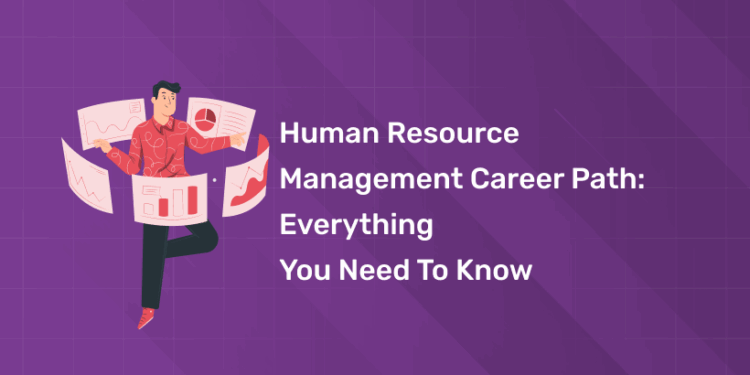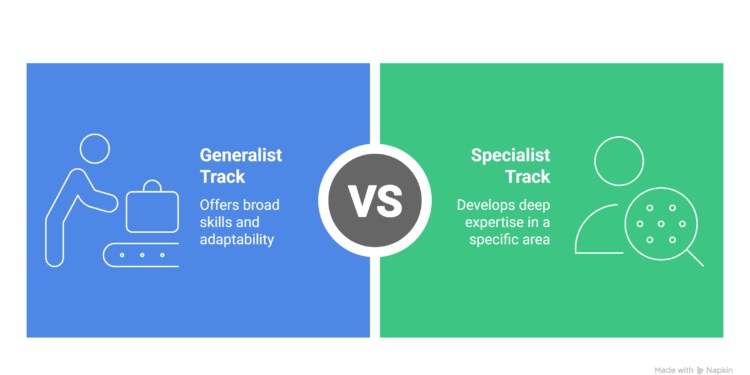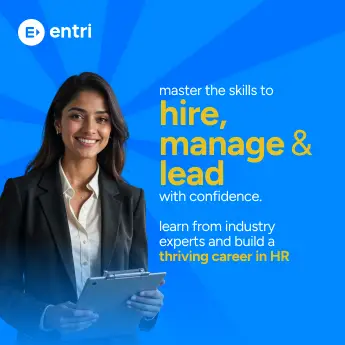Table of Contents
Introduction
Wondering about the potential of a Human Resource Management (HRM) career? As every organization across various industries have this invisible yet indispensable factor, it is indeed a very serious professional role to choose. From recruiting employees with the right talent to building and sustaining a healthy work culture, HR professionals have a strong hold on the success of any organization.
The HRM roles have come a long way from the back-office existence to a more active one that builds on productivity and profit. With today’s workplace becoming more diverse and digital, an HR career offers exciting growth and purpose. Here is a detailed roadmap into the career insights you need for a clear understanding of the fastest way to level-up your impact and earnings.
Boost Your Career with Our HR Management Online Course!
Overview of HR Career Stages
The Human Resource career journey unfolds in progressive steps and offers room for specialization. Here is a list of the different stages in the HR career.
1. HR Assistant/Coordinator (Entry-Level)
This is where you start your HR career from scratch. The major focus will be on handling administrative tasks, recordkeeping, supporting recruitment, etc.
2. HR Executive/Generalist (Junior-Level)
In this stage comes broader responsibilities onboarding and employee relations.
3. HR Manager (Mid-Level)
At this stage, you will be leading teams, framing HR policies and making more strategic plans.
4. HR Director (Senior-Level)
This stage demands organizational strategy and developing long-term talent plans.
5. Chief HR Officer (Leadership Level)
At this peak HR job role, you need to align HR with business goals and leadership development across various enterprises.
Become an HR Expert – Enroll in Our HR Management Course Today!
Unlock the secrets to effective Human Resource Management with our expert-led course! Learn recruitment, employee relations, performance management, and more to build a thriving workplace. Start your journey toward a successful HR career today!
Know MoreRole Profiles & Responsibilities by Level
If you are someone who is just stepping into the HR career pathway, you have the fundamentals to put into work right away. Moving up the ladder of your responsibilities as well as expertise makes you shine brighter in this profession. Levels ranging from HR Assistant to Chief HR Officer might seem a long journey, but it prepares you with the right insights and exposure to perfect your HR roles for good.
Here is a comprehensive idea of the important responsibilities that the HR professionals undertake at each level.
|
Level |
Position |
Responsibilities |
| Entry-Level | HR Assistant/Coordinator | Data entry, scheduling interviews, maintaining HR files |
| Junior-Level | HR Executive/Generalist | Employee relations, training coordination, performance support |
| Mid-Level | HR Manager | Policy implementation, team supervision, compliance audits |
| Senior Level | HR Director | Strategic planning, HR budgeting, workforce planning |
| Leadership Level | CHRO | Culture leadership, succession planning, board-level HR strategy |
Estimated Salary Ranges (Global/India)
Before you make it to this career, it is important that you realize that with the responsibilities being high, you would also be rewarded accordingly. The pay scale for HRM job roles at each level is competitive if you are doing it right.
Here is a list of typical salary ranges you can expect for different HR positions at a global level and in India.
|
Position |
Global (USD) |
Indian (INR) |
| HR Assistant/Coordinator |
$35,000 – $50,000 |
₹3 – 4 L |
| HR Executive/Generalist |
$50,000 – $75,000 |
₹6 – 8 L |
| HR Manager |
$75,000 – $100,000 |
₹8 – 12 L |
| HR Director |
$120,000 – $160,000 |
₹30 – 40 L |
| CHRO |
$175,000 – $250,000 + (top earners) |
₹50 L + (large MNCs)) |
Please note that this may vary depending on the industry you work for, the region you choose to work in, the size of the company you work for and your experience level.
Join our Online HR Management Course. Enroll Now!
Career Ladders: Generalist vs Specialist Track
The HR career landscape offers two important ladders to work with. Let us see how they play against each other so that you can pick the right one for you.
Generalist Path
In this career track you will work along a broad spectrum of HR roles and functions. This primarily includes employee relations and HR strategy. Here is what you can achieve if you choose this path:
- Build business acumen making important business decisions and cross-functional credibility
- Broad HR exposure ideal for Small and Medium Enterprises (SMEs) and start-ups
- Faster route to HR Manager or HR Business Partner (HRBP) roles.
It follows the general career progression from HR Assistant position to CHRO. This path is ideal if you are up for variety in your job roles and you want to master leadership and strategic approaches.
Specialist Path
In this career path you will have a niche to focus on and will be working on the areas specific to the niche. This includes compensation and benefits, recruitment, talent acquisition, and learning and development. The advantages of picking this track includes:
- Dense expertise in one domain.
- High demand among larger enterprises and consulting firms.
- Premium pay potential from mid to senior levels.
It can have career progression tracks with specific roles such as Talent Acquisition Specialist → Recruitment Manager → Head of Talent Acquisition. This path is ideal for anyone with deep expertise and technical mastery.
It is also possible for you to make a shift from one track to another up to the mid level stage.
Become an HR Expert – Enroll in Our HR Management Course Today!
Unlock the secrets to effective Human Resource Management with our expert-led course! Learn recruitment, employee relations, performance management, and more to build a thriving workplace. Start your journey toward a successful HR career today!
Know MoreSkills & Certifications to Climb the Ladder
Like every other job role, the HR career also has in-demand skills and certifications that would make you stand out and relevant to every path you choose. These skills and credentials reflect on your career impact as well as how well you are paid for the work you do.
Must-Have Skills
HR Analytics & Data Literacy
For the modern HR professionals, it is important that you understand and leverage data according to the current demands and functions. HR analytics require statistical tools, dashboards and software like Excel, PowerBI etc, to interpret workforce metrics which includes turnover rates and engagement levels.
Data literacy involves converting numbers into actionable insights. This makes HR a strategic partner in the business. Mastering this one skill can help you make organizational strategies and drive business results efficiently.
Communication & Active Listening
Effective communication can bring about great impact in functioning as an HR professional. You should express policies, initiatives and feedback transparently and be an active receiver of employee’s concerns and requirements. Being strong at communication can build trust and act effectively as a bridge between the management and the staff.
Conflict Resolution
Disputes are common in every workspace. It may be about the roles, performance, policies or the pay. Considering everyone involved fairly and coming up with solutions compatible for both the parties falls on your shoulder. This is important for ensuring a healthy environment and in turn helps reduce further grievances in the organization.
Emotional Intelligence
Emotional intelligence refers to productively managing emotions by recognizing and understanding them well. An HR professional must have a strong rapport with the employees with empathetic leadership handling sensitive situations including mental health issues. This factor can decide your career impact immensely.
Organizational Design and Change Management
Forming teams, assigning them with specific roles and reporting can decide the overall performance of the workplace. Change management is primarily about guiding and supporting the employees through various stages of transformations. This includes situations like cultural shifts or digitalization within the organization. HR professionals need to ensure minimum confusion and smoother transitions.
Certifications
SHRM-CP / SHRM-SCP
The SHRM Certified Professional (CP) and Senior Certified Professional (SCP) are globally recognized certifications provided by the Society for Human Resource Management. HR professionals up to mid-levels can go with SHRM-CP. On the other hand, SHRM-SCP is meant for professionals looking for advanced HR positions. Both offer sound HR knowledge and behavioral requirements necessary for the job roles. These certifications help you in developing the ability to apply complex HR principles in practical situations.
AIHR Certificates
These online certifications are offered by the Academy to Innovate HR. They have their focus on relevant topics like people analytics and HR tech. They offer practical, cutting-edge curricula for professionals from all the HR levels. Anyone wanting to upskill in data-driven or digital-first HR roles can go for it.
PHR / SPHR (HRCI)
The Professional in Human Resources (PHR) and Senior Professional in Human Resources (SPHR) certifications are offered by the HR Certification Institute. PHR focuses on HR management under both technical and operational levels. It is ideal for early to mid-career HR professionals. SPHR is designed for senior leaders who prioritize policy-making, strategy, and organizational planning. Both are highly regarded in the US and serve as proof of expertise and leadership in the HR field.
CIPD (UK)
The Chartered Institute of Personnel and Development (CIPD) is a UK-based body offering professional credentials in HR and people development. There are three levels:
- Foundation
- Associate and
- Chartered
These programmes are essential for HR practitioners in the UK, EMEA (Europe, the Middle East, and Africa), and multinationals seeking global HR best practices and ethical standards.
CIPD Diplomas
The Chartered Institute of Personnel Development (CIPD) diplomas offer an in-depth understanding of the various roles to be played at the different career stages. These diplomas cover HR fundamentals, employment law, and various business strategies. These factors incorporating theoretical and practical knowledge are often required for executive HR roles in Europe and beyond.
Join our Online HR Management Course. Enroll Now!
Strategizing Your Growth
It is important that your services as an HR professional make you stand out and on demand across various enterprises. As a job that requires a strong hold on making strategic decisions, you should start with strategizing your own growth in this professional landscape. Here is a quick list to fast-track your HR career.
Build a Personal Brand
It is important that you make yourself visible to others across industries. Share your HR insights online and speak at various events whenever an opportunity opens up. Mention your experience from any recruitment process, or change management occurrences. Present yourself as approachable for quality services.
Seek Mentorship
You can accelerate your expertise in the career with efficient guides. For this, seek mentorship from experienced and successful leaders who show you the right ways to work things out. Start with attending workshops.
Stay Updated and Keep Upskilling
It is important that you stay updated on tech trends. Keep refreshing your knowledge about HR laws, tech platforms like HRIS (HR Information System) and AI tools. Build fluency in HR dashboards to make informed decisions.
Network Intentionally
Networking is super important no matter which HR level you are in. Attend HR summits and webinars without fail. Join forms like NHRDN (National HR Development Network), SHRM, or LinkedIn HR communities.
Aim for Impact Projects
It is a vital step to align your HR efforts with business KPIs (Key Performance Indicators). Leading an organization-wide DEI (Diversity, Equity and Inclusion) can speed up your career progression.
Conclusion
The HR professional landscape has opened up scope for growth beyond policies and payroll. Having a strong grasp of data analytics and adopting an empathetic approach can make the career smooth and highly rewarding. You should nurture fundamental HR skills while building your credibility with the right certifications. The C-suite seat is closer than you think if you follow all the necessary steps earnestly. Stay updated and have steady growth.
Become an HR Expert – Enroll in Our HR Management Course Today!
Unlock the secrets to effective Human Resource Management with our expert-led course! Learn recruitment, employee relations, performance management, and more to build a thriving workplace. Start your journey toward a successful HR career today!
Know MoreFrequently Asked Questions
Does an HR career have any scope in 2025?
Of course. HR pay scales continue to outpace many functions. It is based on skillset and remote-first hiring.
Which pays HR career path - generalist or specialist?
Specialists undoubtedly are offered better salaries than generalists at the mid-level. This is primarily based on the specified niche expertise that Specialist HR roles have.
Is MBA mandatory for a CHRO position?
Not really. It can be helpful if you have an MBA degree. But executive-level certifications (SHRM-SCP, SPHR) and practical business impact can be done as a substitute.
What software should HR professionals learn?
HRIS platforms like Workday, SAP SuccessFactors and data tools like Power BI, Tableau are the high demand software you need to learn.
How do I switch from recruiter roles to HRBP?
The best way is to get exposed to employee relations and compensation. You can also pursue SHRM-CP to ensure broader knowledge.
Which industry pays HR the most in India?
Generally, IT and consulting industries offer competitive payments. Tech and BFSI (Banking, Financial Services, and Insurance) offer the highest packages, with HR Directors earning ₹40 L and above.
What is the effective and fast-track way to boost my HR salary?
Go for a strategic certification like SHRM CP to begin with. Aim at high-visibility projects that bring up your value and impact in the industry.
How can I build a profile as a fresher without any experience?
You can look up internship programmes to have practical understanding of the job roles. You can also volunteer in recruiting roles that can lead to full-time HR positions.
Should I have thorough knowledge about the Labour Laws for HR roles?
Yes. It is non-negotiable especially if you’re working in compliance or employee relations.
What are the current trends in HR departments?
Major updates include digital advancement caused by factors like AI in recruitment, employee experience platforms, remote work policies, and people analytics.












